 Discount Whey Protein GOLD Standard | Buy Now
Discount Whey Protein GOLD Standard | Buy Now Milk is made of two proteins, casein and whey. Whey protein can be separated from the casein in milk or formed as a by-product of cheese making.
Whey protein is considered a complete protein and contains all 9 essential amino acids and is low in lactose content.
This Medical News Today information article includes information on the composition of whey protein, its use in muscle building, and its potential health benefits. The article also explains some of the side effects associated with whey protein.
A study published in the journal Clinical and Investigative Medicine1 found that whey protein helps reduce weight loss among HIV-positive patients.
Composition and forms of whey protein
Composition: Whey protein is a mixture of the following:
Dear friends, you are reading What is whey protein? Whey Protein For Muscle Building - Whey Protein Side Effects, Dangers & Benefits.
There are three primary types of whey protein : whey protein concentrate (WPC), whey protein isolate (WPI), and whey protein hydrolysate (WPH):
WPH doesn't require as much digestion as the other two forms of whey protein. In addition, it is commonly used in medical protein supplements and infant formulas because of it's improved digestibility and reduced allergen potential.
Muscle building with whey protein
Whey protein supplementation along with resistance exercise can help improve muscle protein synthesis and promote the growth of lean tissue mass.
A study published in the International Journal of Sport Nutrition and Exercise Metabolism concluded that "whey protein supplementation during resistance training offers some benefit compared to resistance training alone." In addition, "males who supplemented with whey protein had a greater relative gain in lean tissue mass."
Much better gains in strength are associated with whey isolate supplementation compared to casein.
This was demonstrated in another study published in the International Journal of Sport Nutrition and Exercise Metabolism, which concluded that in "two groups of matched, resistance-trained males whey isolate provided significantly greater gains in strength, lean body mass, and a decrease in fat mass compared to supplementation with casein during an intense 10-week resistance-training program."
Dear friends, you are reading What is whey protein? Whey Protein For Muscle Building - Whey Protein Side Effects, Dangers & Benefits.
Health benefits of whey protein
There are many benefits associated with the consumption of whey protein, and researchers are constantly finding new possible therapeutic properties.
The possible health benefits of consuming whey protein include:
Side effects
Some people who are allergic to milk may be specifically allergic to whey.
In moderate doses whey protein doesn't generally cause any adverse events.
However, consuming severely high doses can cause:
How is whey protein produced?
When milk is left over and coagulates, it eventually turns into a 5% solution of lactose in water, loaded with minerals.
This leftover by-product, called whey, makes up 20% of the protein in milk, the other 80% is called casein (the curds in cottage cheese).
The liquid whey is separated from the casein and sent through filters to remove all non-whey ingredients. It is then purified in a process called "ion exchange".
The final step is removing the water from the whey by turning it into a powder at a drying tower.
The protein powder is then ready to be packaged and consumed.
Whey protein is considered a complete protein and contains all 9 essential amino acids and is low in lactose content.
This Medical News Today information article includes information on the composition of whey protein, its use in muscle building, and its potential health benefits. The article also explains some of the side effects associated with whey protein.
A study published in the journal Clinical and Investigative Medicine1 found that whey protein helps reduce weight loss among HIV-positive patients.
Composition and forms of whey protein
Composition: Whey protein is a mixture of the following:
- Beta-lactoglobulin
- Alpha-lactalbumin
- Bovine serum albumin
- Immunoglobins
Dear friends, you are reading What is whey protein? Whey Protein For Muscle Building - Whey Protein Side Effects, Dangers & Benefits.
There are three primary types of whey protein : whey protein concentrate (WPC), whey protein isolate (WPI), and whey protein hydrolysate (WPH):
- Whey protein concentrate - WPC contains low levels of fat and low levels of carbohydrates (lactose). The percentage of protein in WPC depends on how concentrated it is. Lower end concentrates tend to have 30% protein and higher end up to 90%.
- Whey protein isolate - WPIs are further processed to remove all the fat and lactose. WPI is usually at least 90% protein.
- Whey protein hydrolysate - WPH is considered to be the "predigested" form of whey protein as it has already undergone partial hydrolysis - a process necessary for the body to absorb protein.
WPH doesn't require as much digestion as the other two forms of whey protein. In addition, it is commonly used in medical protein supplements and infant formulas because of it's improved digestibility and reduced allergen potential.
Muscle building with whey protein
Whey protein supplementation along with resistance exercise can help improve muscle protein synthesis and promote the growth of lean tissue mass.
A study published in the International Journal of Sport Nutrition and Exercise Metabolism concluded that "whey protein supplementation during resistance training offers some benefit compared to resistance training alone." In addition, "males who supplemented with whey protein had a greater relative gain in lean tissue mass."
Much better gains in strength are associated with whey isolate supplementation compared to casein.
This was demonstrated in another study published in the International Journal of Sport Nutrition and Exercise Metabolism, which concluded that in "two groups of matched, resistance-trained males whey isolate provided significantly greater gains in strength, lean body mass, and a decrease in fat mass compared to supplementation with casein during an intense 10-week resistance-training program."
Dear friends, you are reading What is whey protein? Whey Protein For Muscle Building - Whey Protein Side Effects, Dangers & Benefits.
Health benefits of whey protein
There are many benefits associated with the consumption of whey protein, and researchers are constantly finding new possible therapeutic properties.
The possible health benefits of consuming whey protein include:
- Losing weight - according to one study, published in Nutrition & Metabolism, people who took a specialized whey fraction (Prolibra™, high in leucine, bioactive peptides and milk calcium) "lost significantly more body fat and showed a greater preservation of lean muscle compared to subjects consuming the control beverage."
- Anti-cancer properties - Promising results were published in the journal Anticancer Research for the use of whey protein concentrate (WPC) and glutathione modulation in cancer treatment.
- High cholesterol - according to a study published in The British Journal of Nutrition, "there was a significant decrease in total cholesterol and LDL cholesterol at week 12 in the whey group compared with the casein (group)".
- Asthma - whey protein could improve immune response in children with asthma. One study, published in the International Journal of Food Science and Nutrition, found that children with asthma who were supplemented with whey for one month had an improved cytokine response.
- Lowering blood pressure and reducing risk of cardiovascular disease - research published in the International Dairy Journal found that beverages that were supplemented with whey protein significantly reduced blood pressure in patients with hypertension, their risk of developing heart disease or stroke was also lower.
Side effects
Some people who are allergic to milk may be specifically allergic to whey.
In moderate doses whey protein doesn't generally cause any adverse events.
However, consuming severely high doses can cause:
- Stomach pains
- Cramps
- Reduced appetite
- Nausea
- Headache
- Fatigue
How is whey protein produced?
When milk is left over and coagulates, it eventually turns into a 5% solution of lactose in water, loaded with minerals.
This leftover by-product, called whey, makes up 20% of the protein in milk, the other 80% is called casein (the curds in cottage cheese).
The liquid whey is separated from the casein and sent through filters to remove all non-whey ingredients. It is then purified in a process called "ion exchange".
The final step is removing the water from the whey by turning it into a powder at a drying tower.
The protein powder is then ready to be packaged and consumed.



 RSS Feed
RSS Feed